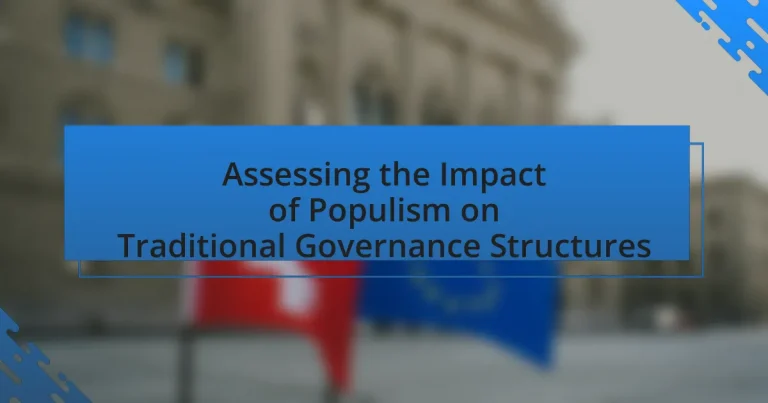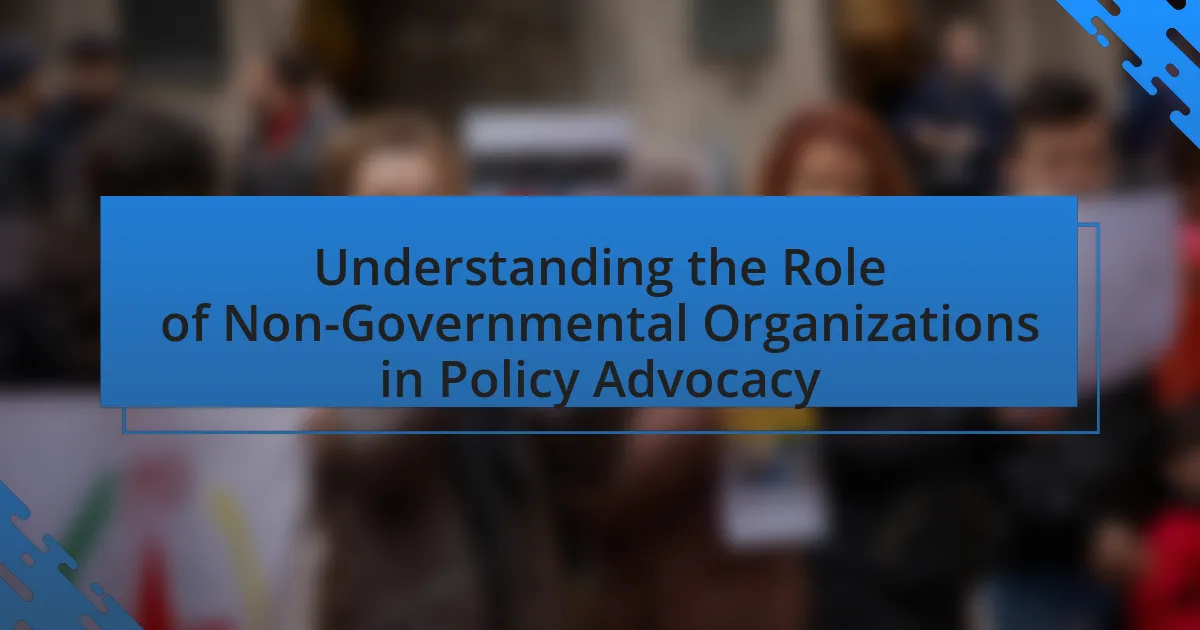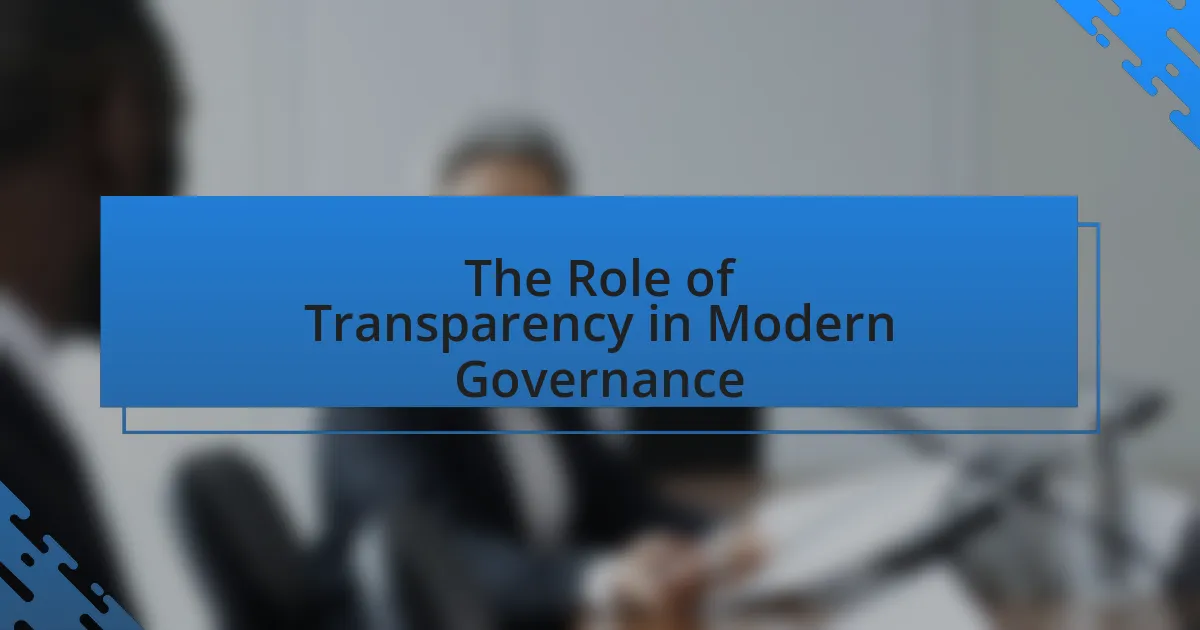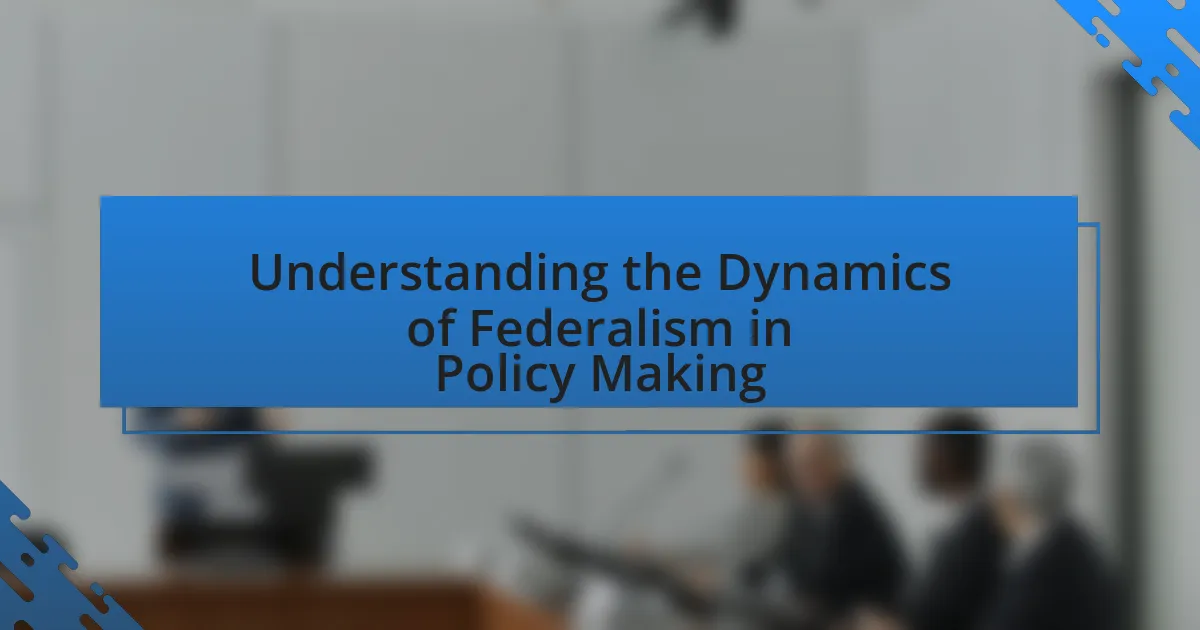The article examines the impact of populism on traditional governance structures, highlighting how populist movements challenge established political norms and institutions. It discusses the redefinition of the relationship between leaders and citizens, characterized by direct appeals to the populace that often bypass institutional processes. Key characteristics of populist movements, their communication strategies, and historical contexts are analyzed, alongside the implications for democratic institutions, the rule of law, and political accountability. The article also explores the effects of economic inequality on the rise of populism and suggests strategies for traditional governance structures to respond effectively to populist sentiments.
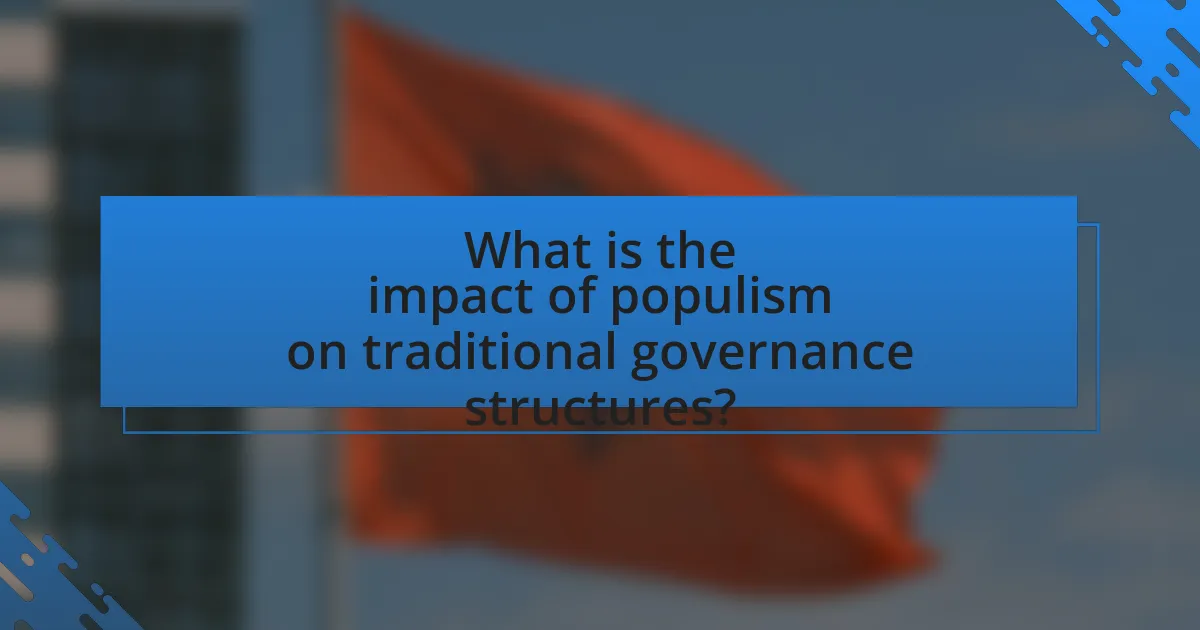
What is the impact of populism on traditional governance structures?
Populism significantly undermines traditional governance structures by challenging established political norms and institutions. This impact is evident in the rise of leaders who prioritize direct appeals to the populace over institutional processes, often leading to the erosion of checks and balances. For instance, in countries like Hungary and Brazil, populist leaders have centralized power, weakened judicial independence, and diminished the role of legislative bodies, thereby altering the dynamics of governance. These changes can result in increased polarization and a decline in democratic accountability, as populist movements often frame political discourse in terms of “the people” versus “the elite,” which can marginalize traditional political parties and institutions.
How does populism redefine the relationship between leaders and citizens?
Populism redefines the relationship between leaders and citizens by positioning leaders as direct representatives of the “common people,” often bypassing traditional political institutions. This shift occurs as populist leaders claim to speak for the masses, fostering a sense of direct connection and loyalty that contrasts with established political norms. For instance, leaders like Hugo Chávez in Venezuela and Donald Trump in the United States utilized populist rhetoric to galvanize support by portraying themselves as outsiders challenging the elite, thereby reshaping citizens’ expectations of political engagement and accountability. This dynamic can lead to increased polarization, as citizens may view dissenting opinions as betrayals of the collective will, further entrenching the populist leader’s authority.
What are the key characteristics of populist movements?
Populist movements are characterized by their appeal to the common people against the elite, a strong anti-establishment sentiment, and the promotion of a unifying national identity. These movements often emphasize direct communication with the public, bypassing traditional media channels, and they typically advocate for policies that resonate with the grievances of the masses, such as economic inequality or cultural dislocation. Historical examples include the rise of leaders like Hugo Chávez in Venezuela and Donald Trump in the United States, both of whom mobilized support by criticizing established political institutions and promising to restore power to the people.
How do populist leaders communicate with their supporters?
Populist leaders communicate with their supporters primarily through direct, emotive messaging that emphasizes a connection with the “common people.” They often utilize social media platforms to bypass traditional media channels, allowing for unfiltered communication and immediate engagement. For instance, leaders like Donald Trump and Jair Bolsonaro have effectively used Twitter and Facebook to share their views, rally support, and mobilize their base, often employing simple language and relatable anecdotes to resonate with their audience. This approach is supported by research indicating that populist rhetoric tends to simplify complex issues, framing them in a way that aligns with the values and concerns of their supporters, thereby fostering a sense of belonging and urgency.
What are the historical contexts of populism affecting governance?
Populism has historically emerged in response to perceived failures of traditional governance, often during periods of economic crisis, social inequality, or political disenfranchisement. For instance, the rise of populist movements in the late 19th century in the United States, such as the People’s Party, was driven by agrarian discontent and economic hardship faced by farmers. Similarly, in Latin America, the mid-20th century saw leaders like Juan Domingo Perón in Argentina capitalize on widespread disillusionment with elite governance, promoting policies that favored the working class. These historical contexts illustrate how populism can reshape governance by challenging established political norms and advocating for the interests of marginalized groups, often leading to significant shifts in policy and political power dynamics.
How have past populist movements influenced current governance structures?
Past populist movements have significantly influenced current governance structures by reshaping political discourse and altering the relationship between citizens and their governments. For instance, the rise of populism in the late 20th century, exemplified by leaders like Hugo Chávez in Venezuela and Donald Trump in the United States, has led to a greater emphasis on direct appeals to the electorate, often bypassing traditional political institutions. This shift has resulted in the erosion of established party systems and the emergence of new political entities that prioritize populist rhetoric, which often emphasizes nationalism and anti-elitism.
Moreover, populist movements have prompted changes in governance practices, such as increased executive power and the undermining of checks and balances, as seen in Hungary under Viktor Orbán. These changes reflect a trend where populist leaders consolidate authority by framing their governance as a direct representation of the “will of the people,” often at the expense of democratic norms and institutions. Thus, the legacy of past populist movements continues to shape contemporary governance by fostering a climate where populist strategies are increasingly normalized in political practice.
What role does economic inequality play in the rise of populism?
Economic inequality significantly contributes to the rise of populism by creating a sense of disenfranchisement among lower-income groups. This economic disparity fosters feelings of alienation and resentment towards established political elites, who are perceived as out of touch with the struggles of ordinary citizens. For instance, research by the International Monetary Fund indicates that rising income inequality can lead to increased political instability and support for populist movements, as marginalized populations seek alternatives to traditional governance structures that they believe have failed them. Additionally, populist leaders often exploit these sentiments by promising to address the grievances of the economically disadvantaged, further solidifying their support base.
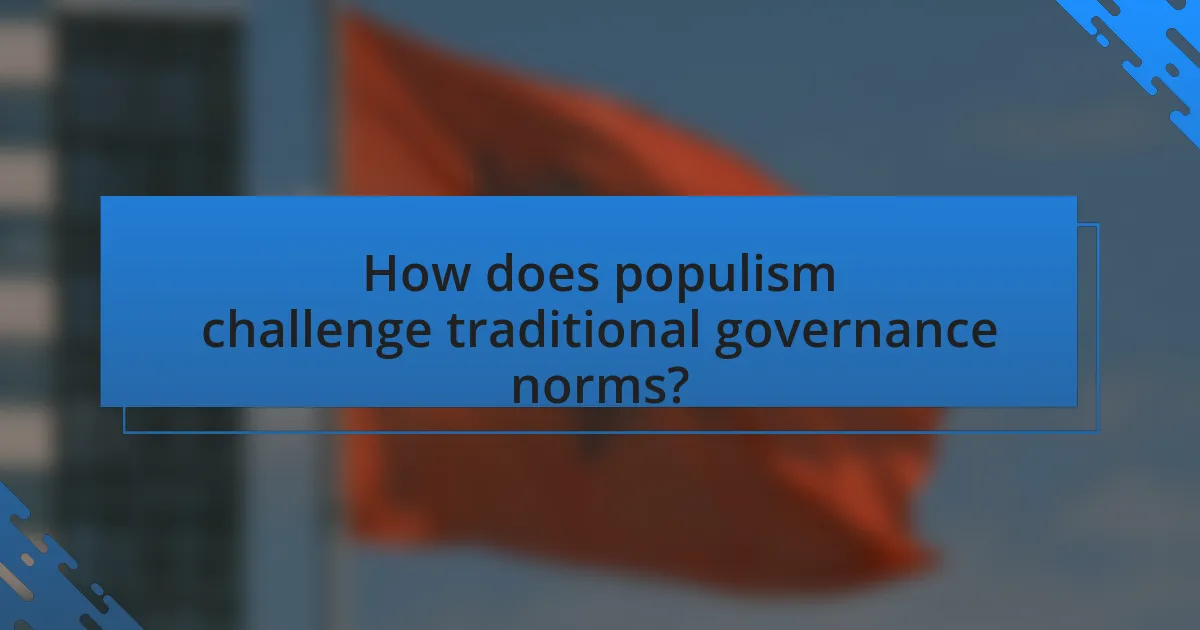
How does populism challenge traditional governance norms?
Populism challenges traditional governance norms by prioritizing the will of the “common people” over established political institutions and elites. This shift often leads to the undermining of checks and balances, as populist leaders may concentrate power and dismiss institutional constraints, claiming to represent the true voice of the populace. For instance, leaders like Hugo Chávez in Venezuela and Donald Trump in the United States have both employed populist rhetoric to justify actions that bypass traditional legislative processes, thereby altering the dynamics of governance. Such actions can erode democratic norms and weaken the rule of law, as seen in various countries where populist movements have gained traction, leading to increased polarization and instability in political systems.
What are the implications of populism for democratic institutions?
Populism undermines democratic institutions by eroding checks and balances, fostering polarization, and diminishing the role of political parties. When populist leaders prioritize direct appeals to the public over institutional processes, they often bypass established norms, leading to weakened judicial independence and legislative oversight. For instance, in Hungary, Prime Minister Viktor Orbán’s government has systematically curtailed the powers of the Constitutional Court and altered electoral laws to consolidate power, illustrating how populism can distort democratic frameworks. Additionally, populism tends to create an “us versus them” mentality, which exacerbates societal divisions and can lead to the marginalization of dissenting voices, further threatening the pluralism essential for healthy democracies.
How does populism affect the rule of law?
Populism undermines the rule of law by prioritizing the will of the majority over established legal frameworks. This shift often leads to the erosion of judicial independence, as populist leaders may seek to influence or control the judiciary to align with their political agendas. For instance, in Hungary, Prime Minister Viktor Orbán’s government has implemented reforms that weaken the Constitutional Court’s authority, demonstrating how populist governance can directly challenge legal norms and institutions. Such actions create an environment where laws are applied selectively, diminishing accountability and fostering a culture of impunity.
What impact does populism have on political accountability?
Populism significantly undermines political accountability by fostering a direct relationship between leaders and the electorate, often bypassing established institutional checks and balances. This phenomenon occurs as populist leaders claim to represent the “will of the people,” which can lead to the erosion of democratic norms and accountability mechanisms. For instance, in countries like Venezuela under Hugo Chávez, the concentration of power in the executive branch diminished the role of legislative and judicial institutions, reducing their ability to hold the government accountable. Consequently, populism can create an environment where leaders operate with less scrutiny, increasing the risk of corruption and abuse of power.
In what ways does populism alter policy-making processes?
Populism alters policy-making processes by prioritizing the will of the “common people” over established political institutions and expert opinions. This shift often leads to a more direct form of democracy, where leaders may bypass traditional legislative procedures to implement policies that resonate with popular sentiment. For instance, populist leaders frequently utilize referendums to legitimize their decisions, as seen in the Brexit vote, which allowed the public to directly influence a significant policy outcome. Additionally, populism can result in the erosion of checks and balances, as leaders may consolidate power and undermine institutional authority, exemplified by the actions of populist governments in Hungary and Poland, where judicial independence has been compromised. These alterations can lead to rapid policy changes that reflect immediate public demands rather than long-term strategic planning.
How do populist policies differ from traditional governance policies?
Populist policies differ from traditional governance policies primarily in their approach to representation and decision-making. Populist policies often emphasize direct appeal to the general populace, prioritizing the will of the majority and often bypassing established political institutions, while traditional governance policies typically rely on established political frameworks, expert opinions, and institutional processes to make decisions. For example, populist leaders may advocate for referendums or direct votes on key issues, reflecting a belief in the direct voice of the people, whereas traditional governance tends to involve deliberation and compromise among elected representatives. This fundamental difference can lead to significant shifts in policy-making and governance styles, as seen in various countries where populist movements have gained traction, such as the rise of leaders like Donald Trump in the United States and Jair Bolsonaro in Brazil, who both challenged conventional political norms and structures.
What are the consequences of populist policies on public services?
Populist policies often lead to the deterioration of public services due to prioritization of short-term political gains over sustainable governance. For instance, populist leaders may implement tax cuts or increase public spending without adequate funding sources, resulting in budget deficits that compromise the quality and availability of essential services like healthcare and education. A study by the International Monetary Fund in 2019 highlighted that countries adopting populist measures experienced a decline in public investment, which directly affected service delivery and infrastructure maintenance. This trend indicates that while populist policies may initially gain public support, they ultimately undermine the effectiveness and reliability of public services.
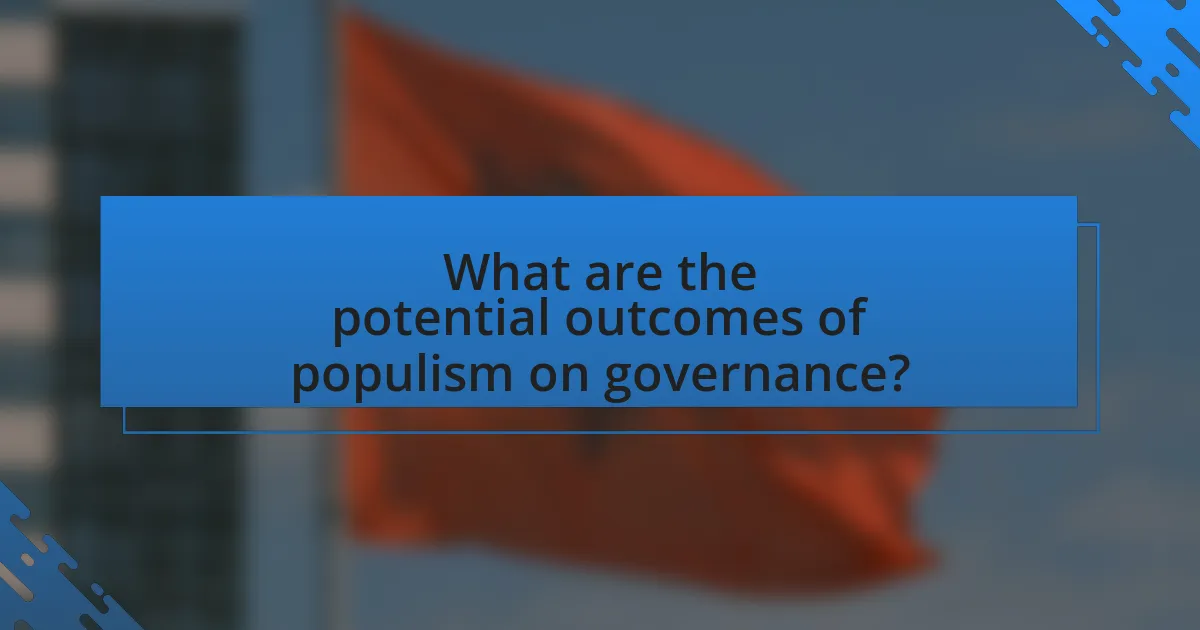
What are the potential outcomes of populism on governance?
Populism can lead to significant changes in governance, often resulting in increased polarization and a challenge to established political norms. This shift occurs as populist leaders typically position themselves against the political elite, claiming to represent the “common people.” For instance, the rise of populist movements in countries like Hungary and Brazil has led to the erosion of checks and balances, as these leaders consolidate power and undermine judicial independence. Additionally, populism can foster a climate of distrust towards institutions, which may weaken democratic processes and lead to authoritarian tendencies, as seen in Venezuela under Hugo Chávez. These outcomes illustrate how populism can disrupt traditional governance structures and alter the political landscape.
How does populism influence political stability?
Populism influences political stability by creating a divide between the elite and the general populace, often leading to increased polarization and social unrest. This ideological framework can destabilize traditional governance structures, as populist leaders frequently challenge established institutions and norms, claiming to represent the “will of the people.” For instance, in countries like Venezuela under Hugo Chávez, populist policies led to significant economic turmoil and social conflict, undermining political stability. Additionally, research by Cas Mudde and Cristóbal Rovira Kaltwasser highlights that populism can erode trust in democratic institutions, further exacerbating instability.
What are the risks of populism leading to authoritarianism?
Populism poses significant risks of leading to authoritarianism by undermining democratic institutions and promoting a concentration of power. When populist leaders gain support by appealing directly to the masses, they often dismiss established checks and balances, arguing that they represent the “true will” of the people. This can result in the erosion of judicial independence, as seen in countries like Hungary, where the government has systematically weakened the judiciary to consolidate power. Additionally, populism can foster an environment of polarization and division, which may lead to the suppression of dissent and the marginalization of opposition voices, as evidenced by the actions of populist regimes in Venezuela under Hugo Chávez. These dynamics create a pathway for authoritarian governance, where democratic norms are replaced by autocratic rule.
How can populism affect social cohesion within a society?
Populism can undermine social cohesion within a society by fostering division and polarization among different social groups. This occurs as populist leaders often frame political discourse in terms of “us versus them,” creating an environment where societal divisions are emphasized and exploited. For instance, research by Cas Mudde and Cristóbal Rovira Kaltwasser highlights that populism tends to appeal to the grievances of specific segments of the population, which can lead to the marginalization of others and exacerbate existing social tensions. Consequently, this divisive rhetoric can weaken trust in institutions and diminish the sense of community, ultimately destabilizing social cohesion.
What strategies can traditional governance structures adopt in response to populism?
Traditional governance structures can adopt strategies such as enhancing public engagement, improving transparency, and fostering inclusive dialogue to effectively respond to populism. By actively involving citizens in decision-making processes, governance can counteract the alienation that often fuels populist sentiments. For instance, participatory budgeting initiatives have been implemented in various cities worldwide, allowing citizens to directly influence budget allocations, thereby increasing trust in governance. Additionally, transparency measures, such as open data initiatives, can help demystify government actions and reduce the appeal of populist rhetoric that often thrives on misinformation. Furthermore, creating platforms for inclusive dialogue can bridge divides and address the concerns of marginalized groups, which populists often exploit. These strategies collectively strengthen democratic resilience against populism by reinforcing the legitimacy and accountability of traditional governance structures.
How can traditional leaders engage with populist sentiments constructively?
Traditional leaders can engage with populist sentiments constructively by actively listening to the concerns of their communities and incorporating those perspectives into their governance. This approach fosters trust and demonstrates that traditional leaders value the voices of the populace, which is essential in a populist context where citizens often feel marginalized. For instance, leaders can hold community forums to discuss local issues, thereby creating a platform for dialogue and collaboration. Research indicates that participatory governance enhances community cohesion and can lead to more effective policy outcomes, as seen in various case studies where traditional leaders successfully integrated local feedback into decision-making processes.
What best practices can be implemented to mitigate the negative effects of populism?
To mitigate the negative effects of populism, fostering inclusive political dialogue is essential. This practice encourages diverse viewpoints and reduces polarization, which is often exacerbated by populist rhetoric. Research indicates that countries with strong democratic institutions and open channels for public discourse experience less volatility from populist movements. For instance, the 2019 study by the International Institute for Democracy and Electoral Assistance highlights that nations with robust civic engagement frameworks are better equipped to counteract populist narratives. Additionally, promoting media literacy among citizens can help them critically evaluate populist claims, thereby reducing susceptibility to misinformation.
What lessons can be learned from the interaction between populism and governance?
The interaction between populism and governance teaches that populism can disrupt traditional governance structures by prioritizing the will of the majority over institutional checks and balances. This disruption often leads to the erosion of democratic norms, as seen in countries like Hungary and Venezuela, where populist leaders have undermined judicial independence and media freedom to consolidate power. Additionally, the rise of populism highlights the importance of addressing public grievances and economic inequalities, as failure to do so can result in political instability and the rise of authoritarianism. These lessons underscore the need for resilient governance frameworks that can adapt to populist pressures while maintaining democratic integrity.
